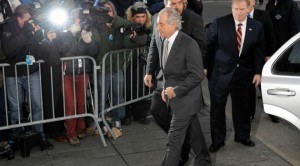The name of the most reviled member of the American Jewish community hangs in a place of honor in the lobby of the Center for Jewish History, in Manhattan.
In a field of plaques commemorating donors to CJH, one stands out. Below etched lines naming the CEO of the World Championship of Ping Pong and the scion of a powerful Cleveland real estate family is the name of a man who has fallen from the heights of Park Avenue to a federal correctional facility in North Carolina: Bernard Madoff.
Six years after Madoff’s indictment in a multibillion-dollar Ponzi scheme, and five years into his 150-year prison sentence, Madoff’s name has yet to be scrubbed by CJH. That plaque appears to be the only remaining public honor held by the convicted felon, who once sat on the boards of Yeshiva University and New York City Center.
CJH has no plans to remove Madoff’s name or that of his wife, Ruth Madoff. “The Center for Jewish History received a gift from Mr. Madoff in 1999, when the institution was being built,” CJH’s executive director Joel Levy said in a statement to the Forward. “At the Center, we preserve history. We don’t rewrite it.”
As the Madoff affair recedes into history, the meaning of the scandal is still in flux. The Madoff name remains poison to many. But others see the Ponzi schemer as a fall guy for a system that failed. Still others wonder how the public suffering of his family since his arrest will ultimately affect how the Madoff family is remembered.
Shakespearean havoc has been wreaked on Madoff’s children since the collapse of the Ponzi scheme. His elder son, Mark Madoff, hanged himself with a dog leash on the second anniversary of his father’s arrest, in December 2010. He was 46. This past September, Madoff’s younger son, Andrew Madoff, died of cancer at age 48. Unlike his mother, who has almost disappeared from public view since her husband’s arrest, Andrew Madoff lived a public life in his final years.

